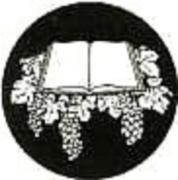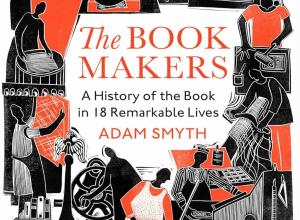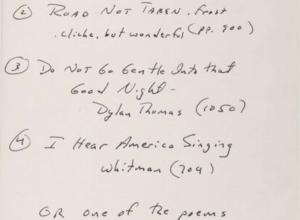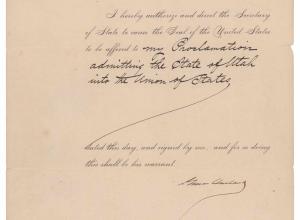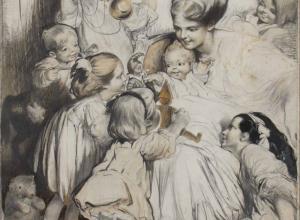Wolfson History Prize 2020 Shortlist Announced
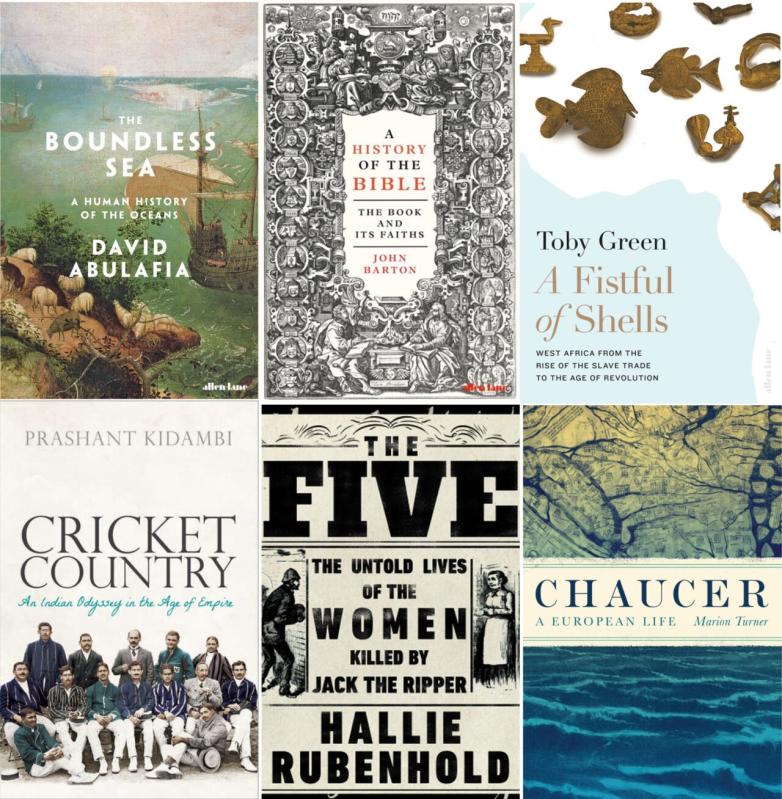
London — The shortlist for the Wolfson History Prize 2020, the most valuable non-fiction writing prize in the UK, has been announced today, recognising the best factual history writing from the past year.
This year’s shortlist has a distinctly global focus, with five of the six titles exploring non-British history. International topics covered in the shortlist range from a human history of the oceans, to an exploration of Chaucer’s relationship with Europe, to a history of West Africa from the rise of the slave trade to the age of revolution, to looking at Anglo-Indian relations through the untold history of the first All India cricket team, to a seminal study of the impact of the Bible on world religions and cultures. Meanwhile, the only exclusively British history on the 2020 shortlist sheds light on the untold lives of the women killed by Jack the Ripper.
The shortlist announcement comes as historical non-fiction sees a 14 per cent uplift in sales over the past five years, with World History experiencing phenomenal growth in the UK, with a 92 per cent increase in book sales since 2015, according to new data from Nielsen Book.
The books shortlisted for the Wolfson History Prize 2020 are:
· The Boundless Sea: A Human History of the Oceans (Allen Lane) by David Abulafia
· A History of the Bible: The Book and Its Faiths (Allen Lane) by John Barton
· A Fistful of Shells: West Africa from the Rise of the Slave Trade to the Age of Revolution (Allen Lane) by Toby Green
· Cricket Country: An Indian Odyssey in the Age of Empire (Oxford University Press) by Prashant Kidambi
· The Five: The Untold Lives of the Women Killed by Jack the Ripper (Doubleday) by Hallie Rubenhold
· Chaucer: A European Life (Princeton University Press) by Marion Turner
Chair of the judges and President of the British Academy, David Cannadine, said of the shortlist: “This year’s shortlist has a decidedly global theme. The list is a demonstration of the range and quality of history writing in the UK today, both within and without academia. These are books that engross, challenge and delight - and which draw the readers into worlds as diverse as Indian cricket, Victorian London and the kingdoms of West Africa. I am very grateful to my fellow judges for their time and wisdom, and it is with great enthusiasm that we announce the shortlist for 2020.”
Paul Ramsbottom, chief executive of the Wolfson Foundation, which awards the Prize, commented, “The Wolfson History Prize is awarded by the Wolfson Foundation as an expression of the importance of history to the life of the country. The Prize recognises books that brim with brilliance and that break new ground in our understanding of past societies across the globe. These are books which are compellingly written to appeal to all.
We are living in a strange and unsettling moment, but the value of books and reading is perhaps emphasised as never before during lockdown - when many of us are looking for distraction, entertainment and education.”
The shortlist demonstrates the incredible breadth and scale which can be found in historical writing, with titles examining centuries or millennia of human history appearing next to intimate explorations of individual lives and short periods of time which nevertheless had a profound impact on wider history.
Several of the shortlisted titles examine long swathes of history, putting in focus not only the impact of events on society, but also how these histories are then remembered later on. The Boundless Sea: A Human History of the Oceans by David Abulafia is an exploration of the relationship between mankind and the seas throughout history, tracing our interaction with the oceans from the Polynesians of the Pacific, one of the earliest seafaring societies, to now. In A History of the Bible: The Book and Its Faiths, John Barton tackles a similarly vast topic, charting the history of the bible from its origins to its interpretations today, examining who its authors were, how its interpretations have evolved over time, and the interplay between religion and text. A Fistful of Shells: West Africa from the Rise of the Slave Trade to the Age of Revolution by Toby Green similarly looks at how history is reinterpreted by later generations, and how this can result in a collective ignorance of entire countries’ pasts. Exploring the history of pre-colonial West Africa, Green dismantles the Western notion that Africa had little history before European colonisation, and reveals the rich and complex history of the region over a thousand years.
Meanwhile, more focused studies of the importance of individuals and specific historical periods which had a significant impact on history include: The Five: The Untold Lives of the Women Killed by Jack the Ripper by Hallie Rubenhold, a nuanced reframing of the narrative around the infamous Victorian serial killer that shifts the focus to the victims and their lives, providing an insight into the five women whose identities have been largely been obscured by our cultural obsession with the Ripper’s identity. In Chaucer: A European Life, Marion Turner likewise queries how we traditionally view “well-known” historical figures and stories, shining a light on the distinctly European influences that shaped the life and work of The Canterbury Tales author. By following Chaucer’s adventures across Europe, Turner reveals how the “father of English literature” was in fact a cosmopolitan figure influenced heavily by the Continent, casting both his writing and his historical legacy into a new light, while showing that Chaucer’s life and writings have much to teach anyone with an interest in European cultural history. Finally, Prashant Kidambi’s Cricket Country: An Indian Odyssey in the Age of Empire first All India cricket tour of Great Britain and Ireland during the coronation summer of 1911 is a prism through which to explore colonial relations, the last days of the British Empire, and the beginning of Indian nationhood.
The winner of the Wolfson History Prize 2020 will be announced on Monday 15th June 2020 in a virtual ceremony. The winner of the Wolfson History Prize, the most valuable non-fiction writing prize in the UK, will be awarded £40,000, with each of the shortlisted authors receiving £4,000.
The Wolfson History Prize 2020 shortlisted authors will discuss their books and historical writing in a special edition of BBC Radio 3’s Free Thinking on a date to be announced.
The Wolfson History Prize is run and awarded by the Wolfson Foundation, an independent charity that awards grants in the fields of science, health, education, arts & humanities. The Wolfson History Prize 2019 was won by Mary Fulbrook for her exploration of justice in the wake of World War Two, Reckonings: Legacies of Nazi Persecution and the Quest for Justice.





